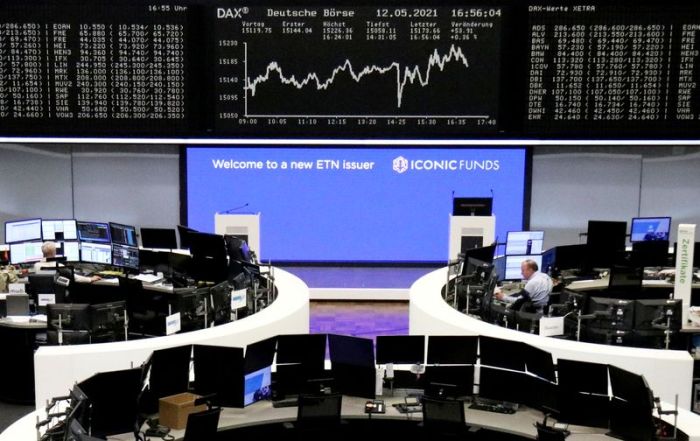(Reuters) – U.S. stocks ended down on Tuesday, slumping on a sharp decline in telecom stocks and weak housing starts data that overshadowed better-than-expected earnings from Walmart and Home Depot.
AT&T Inc shed 5.8%, among the biggest percentage decliners in the benchmark S&P 500. It extended declines from Monday, when the telecoms firm said it would cut its dividend payout ratio as a result of its $43 billion media asset deal with Discovery Inc.
T-Mobile and Verizon Communications also dropped 3.71% and 1.31%.
Eight of 11 major S&P sectors ended the session in the red, with Energy and Industrials having largest percentage decline, according to Refinitiv data. Utilities were basically flat.
The three main indexes opened higher after Walmart, the world’s biggest retailer, raised its full-year earnings forecast and Home Depot reported quarterly same-store sales above estimates.
“Those are both emblematic of strength in the corporate sector and also of the consumer. I mean, you can’t have Walmart and Home Depot have blowout earnings without the consumer really stepping up spending stimulus checks, adopting ecommerce, as well as getting back into stores”, said Ross Mayfield, investment strategist at Baird in Louisville, Kentucky. “And a lot of the bull thesis for the market right now is still built on a really strong reopening of the economy.”
Despite its strong results, Home Depot’s shares went down 1.02%, under pressure due to the lack of a solid outlook and the housing data.
Latest data showed U.S. homebuilding fell more than expected in April, likely pulled down by soaring prices for lumber and other materials.
Minutes from the Fed’s April policy meeting will be parsed on Wednesday for the central bank’s view of the economy.
“The market is bracing for a transition,” said Quincy Krosby, chief market strategist at Prudential Financial in Newark, New Jersey. “So there’s a little bit of de-risking going on.”
Wall Street has been volatile in recent days, with investors worried that an overheating economy could prompt the Federal Reserve to rein in its monetary support following a spike in volatility last week after strong inflation readings.
The Dow Jones Industrial Average fell 267.13 points, or 0.78%, to 34,060.66, the S&P 500 lost 35.46 points, or 0.85%, to 4,127.83 and the Nasdaq Composite dropped 75.41 points, or 0.56%, to 13,303.64.
Fund managers recently trimmed their overweight positions on technology stocks to a three-year low as inflation worries left growth stocks vulnerable to a pullback, and turned overweight on UK stocks for the first time in seven years, a survey from Bank of America showed.
Volume on U.S. exchanges was 10.01 billion shares, compared with the 10.48 billion average for the full session over the last 20 trading days.
Declining issues outnumbered advancing ones on the NYSE by a 1.09-to-1 ratio; on Nasdaq, a 1.07-to-1 ratio favored advancers.
The S&P 500 posted 43 new 52-week highs and no new lows; the Nasdaq Composite recorded 105 new highs and 50 new lows.
(Reporting by Echo Wang in New York; Additional reporting by Caroline Valetkevitch in New York, Medha Singh and Shashank Nayar in Bengaluru; Editing by Maju Samuel and Aurora Ellis)


























